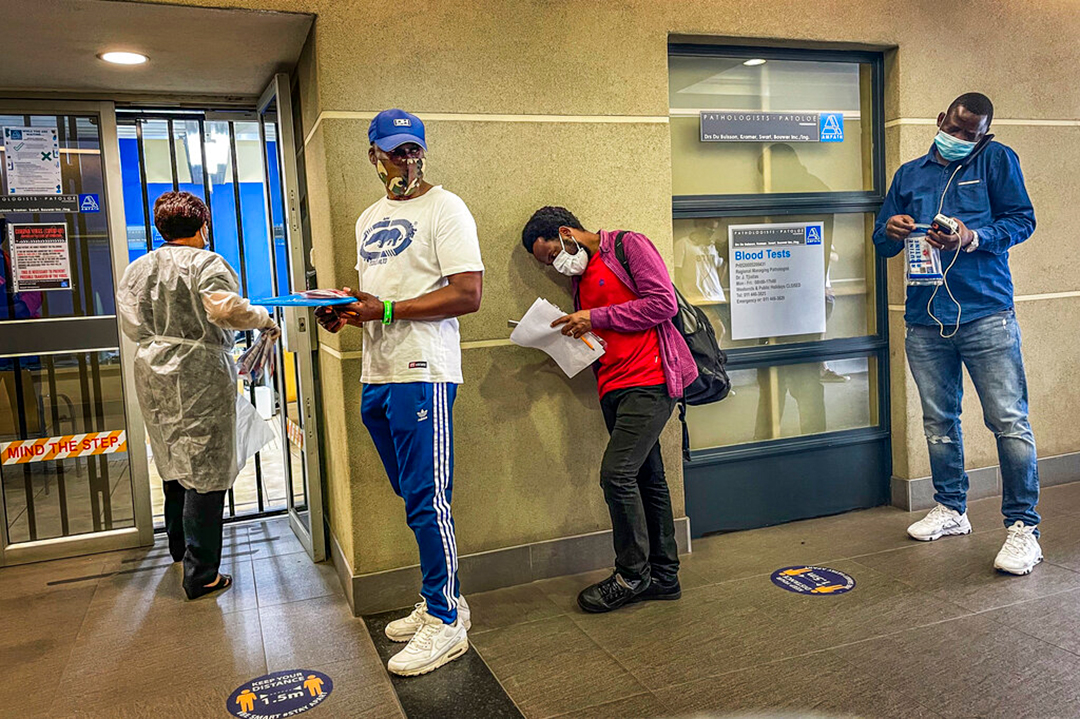COVID-19 Cases Spike Across Africa
ADF STAFF
A second wave of COVID-19 cases is rising across Africa.
From South Africa to Nigeria, Uganda and Rwanda, the pandemic’s surge is overwhelming health systems still reeling from the first wave. It also is threatening areas that previously escaped high numbers of infections and deaths.
South Africa’s second wave was cresting in mid-January, weeks after a new variant of the virus was detected there. The nation reported an average 30% weekly increase in COVID-19 cases and a 35% average weekly increase in deaths over four weeks ending on January 10, according to the Africa Centres for Disease Control and Prevention.
The government announced it will receive 1.5 million doses of the AstraZenenca vaccine from the Serum Institute of India for health workers in January, while authorities said the country has secured 20 million doses of vaccines that will be delivered later this year, according to a Quartz Africa report.
Although a mutation in the new COVID-19 strain worries some scientists who don’t know how effective the vaccines will be against it, Glenda Gray, president of the South African Medical Research Council, expressed optimism.
“Vaccines induce a broad and variable response, so we don’t think [the second strain] will affect the vaccine,” Gray toldQuartz Africa. “But we need to monitor this and evaluate whether it has an impact on vaccine efficacy. We need to evaluate what role it plays in reinfection.”
As the second wave raged in South Africa, President Cyril Ramaphosa reimposed strict lockdown measures, blaming complacency for the surge in cases.
“We have let our guard down, and unfortunately we are now paying the price,” he said in a televised address.
Another COVID-19 strain, different from South Africa’s, has been reported in Nigeria, where the reported number of infections and deaths has risen steadily since early December 2020.
Chikwe Ihekweazu, head of the Nigeria Centre for Disease Control, told the BBC that the country is reaching “a critical level” at which its hospital capacity cannot handle the most serious cases.
Sani Aliyu, national coordinator for Nigeria’s Presidential Task Force, said in a televised address January 15 that the government will not reimpose lockdown measures because health officials expected to receive 100,000 COVID-19 vaccine doses by the end of January and an additional 10 million vaccines by March.
In Uganda, the Mulago National Referral Hospital was strained by a surge of COVID-19 infections in late December 2020. There were only eight functional beds in the intensive care unit, and oxygen was in short supply, leaving staff scrambling to handle an influx of patients. In response, the Health Ministry was recruiting more doctors and nurses, Voice of America (VOA) reported.
“There’s increased demand for high acute beds, that is, high-dependency units and intensive care units. Two, there’s increased requirement for round-the-clock patient care and monitoring with more staff required than would normally be expected,” Joyce Moriku Kaducu, Uganda’s state minister for health, told VOA, adding that oxygen use had increased “by over tenfold.”
Yonas Tegegn Woldemariam of the World Health Organization said Uganda’s second wave came after officials lifted a national lockdown and people resumed gathering in groups.
“Until people keep distance, do these meetings in small numbers … and keep hands hygienic, more and more Ugandans will get sick,” Yonas told VOA. “And the more and more people get sick, the health services will not be able to cope with it.”
Praised by the WHO for its handling of COVID-19, Rwanda kept infection rates and deaths low during the virus’s first wave through medical innovations, imaginative technology use and its government’s proactive response.
But the country registered 722 new cases in December 2020, nearly as many as the 797 infections it reported from March through November, according to the Times of India.
The Africa CDC reported more than 80 Rwandan deaths from COVID-19 in mid-January, but health officials worried that the number would rise as more than 40 virus patients were in critical condition at Rwanda Biomedical Centre, Sabin Nsanzimana, the facility’s director-general, told Rwanda’s New Times newspaper.
The second wave forced officials to transform Nyarugenge District Hospital into a COVID-19 treatment facility capable of housing almost 140 patients in its intensive care unit.
“We are anticipating a situation where patients in critical condition will continue to increase,” Nsanzimana told New Times. “Establishing the facility is part of the efforts to ensure that such patients are well treated, and that’s the only way we can go about it.”


Comments are closed.